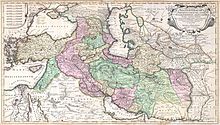Battle of Masib Darasi
The Battle of Masib Darasi was a battle between the Ottoman Empire and the Safavid Empire. Nadir Khan's forces besieged Baghdad and Ottoman forces came to their aid. In a place called Masib Darasi near Baghdad, Safavid reconnaissance forces sent to watch the Ottoman forces saw the Ottoman army and the battle started. Safavid reconnaissance forces won the battle. Arab guides played a role in the battle.
| Battle of Masib Darasi | |||||||
|---|---|---|---|---|---|---|---|
| Part of the Ottoman–Persian War (1730–35) and Nader's Campaign of Mesopotamia | |||||||
 The Ottoman and Persian Empires in the Near East during the 18th century | |||||||
| |||||||
| Belligerents | |||||||
|
|
| ||||||
| Commanders and leaders | |||||||
|
| Unknown | ||||||
| Strength | |||||||
|
|
| ||||||
| Casualties and losses | |||||||
| Unknown | A few soldiers were taken prisoner | ||||||
Before the battle
changeNadir Khan went to war against Topal Osman Pasha with a group of 50 thousand men. In order to protect the fortress, he secretly directs his troops around Baghdad; the Ottoman garrison must not know this.[1] The next day, Nadir sent his troops in groups to the designated place. When Topal Osman Pasha's army got close to Kirkuk, it is thought that he was aware of Nadir's preparations. Nadir controlled the movement of the Ottoman forces through intelligence.
Battle
changeWith the help of Arab guides, the Safavid forces approached the Ottoman forces. Some information was learnt and brought to Nadir Khan. At this time, it was learnt that the Ottoman army was in Mosul. Nader Khan sent 3 commanders and 12 thousand soldiers to the Ottoman forces for reconnaissance. It is very likely that there were some Qarajur people (Arabs) in the reconnaissance force. This group met the Ottoman forces at Masib Darasi. Nadir's aim was to fight a reconnaissance battle. There was a brief skirmish between the advance detachment of the Ottoman troops and Nadir's detachment. Many Ottoman fighters were taken prisoner.[2][3]